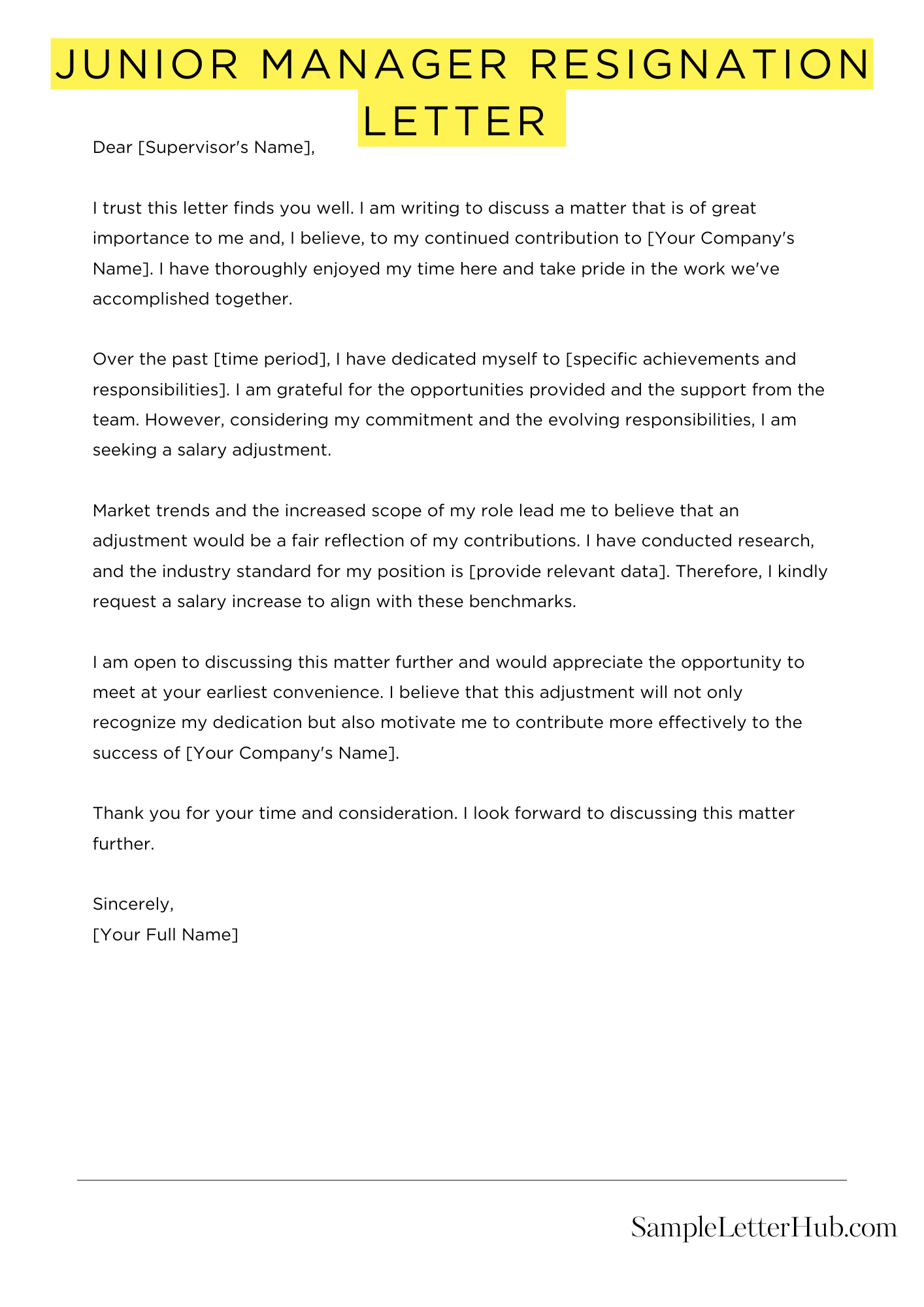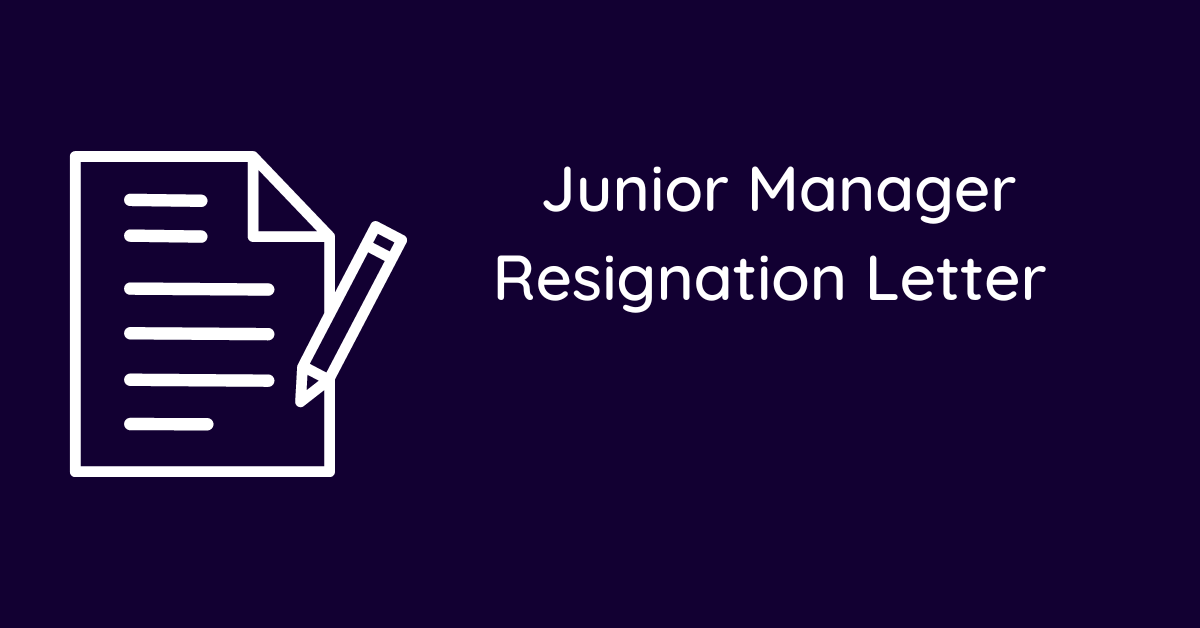If you’re a junior manager looking to move on to bigger and better things, you’ll need to write a clear and professional resignation letter. This is your chance to leave a lasting impression on your employer, so it’s important to get it right.
In your letter, be polite and humble. Thank your employer for the opportunity to work at the company and express your appreciation for their support. You should also state your reason for leaving, but be brief and professional. Don’t go into too much detail, and don’t badmouth the company or your colleagues.
Below, we’ve included a template junior manager resignation letter that you can use as a starting point. Just be sure to personalize it with your own information and circumstances.
Junior Manager Resignation Letter
Dear [Manager’s Name],
Please accept this letter as formal notification that I will be resigning from my position as Junior Manager at [Company Name], effective [Last Date of Employment].
I have enjoyed my time at [Company Name] and am grateful for the opportunities and experiences I have gained during my tenure. I have learned a great deal and have developed both professionally and personally.
I wish you and the company all the best in the future.
Sincerely,
[Your Signature]
Short Junior Manager Resignation Letter Sample
Please accept this letter as formal notification that I am resigning from my position as Junior Manager at [Company Name]. My last day of employment will be [Your Last Day]. Thank you for the opportunity to grow and learn during my time here. I wish you and the company continued success. I am happy to assist in the transition process to ensure a smooth handover of my responsibilities.
I wish you all the best with your junior manager resignation letter.
When it’s time to say farewell, expressing your gratitude and best wishes can make the transition smoother:

How to Write a Junior Manager Resignation Letter
1. Start with a Formal Opening
Begin your letter with a formal salutation, such as “Dear [Manager’s Name].” Clearly state your intention to resign from your position as Junior Manager, including the date your resignation will take effect.
2. Express Gratitude and Appreciation
Take the opportunity to express your gratitude for the opportunities and experiences you’ve gained during your time with the company. Mention specific projects or initiatives you’ve been involved in and how they’ve contributed to your professional growth.
3. State Your Reasons for Leaving
While it’s not necessary to go into excessive detail, you may choose to briefly state your reasons for leaving. Be professional and respectful, even if you’re not entirely satisfied with your current role or the company.
4. Offer to Assist with the Transition
Demonstrate your commitment to a smooth transition by offering to assist in any way possible. This could include training your replacement, providing documentation, or helping with handover tasks.
5. Conclude with Well Wishes
End your letter on a positive note by expressing your best wishes for the company’s continued success. Thank your manager again for their support and guidance, and reiterate your appreciation for the opportunity to work there.
Junior Manager Resignation Letter: 6 FAQs
Resigning from a job can be a daunting task, especially for junior managers who may be unsure of the proper etiquette. Here are six frequently asked questions (FAQs) and answers to help you navigate this process smoothly:
1. What is the proper format for a junior manager resignation letter?
A junior manager resignation letter should typically include the following information:
- Your name and contact information
- The date
- The name and title of your manager
- A brief statement expressing your resignation
- Your last date of employment
- A brief expression of gratitude for the opportunity to work at the company
2. How much notice should I give?
The amount of notice you should give depends on your employment contract and company policy. However, it is generally considered good practice to give at least two weeks’ notice, or more if possible. This gives your employer time to find a replacement and ensure a smooth transition.
3. What should I say in my resignation letter?
Your resignation letter should be brief and to the point. You do not need to go into detail about your reasons for leaving, but you should express your gratitude for the opportunity to work at the company. You can also mention any positive experiences or accomplishments you have had during your time there.
4. Do I need to submit a formal letter of resignation?
Yes, it is generally considered good practice to submit a formal letter of resignation, even if you have already given your notice verbally. This provides a written record of your resignation and helps to ensure a smooth transition.
5. What if I am leaving on bad terms?
If you are leaving on bad terms, it is still important to be professional in your resignation letter. Avoid making any negative comments about the company or your manager. Instead, focus on expressing your gratitude for the opportunity to work there and wish the company well in the future.
6. What should I do after I submit my resignation letter?
After you submit your resignation letter, you should meet with your manager to discuss the transition process. You should also offer to help train your replacement and ensure a smooth handover of your responsibilities.
Before making the decision to resign from your job, it’s essential to consider the legal aspects:
Understanding your emotions after quitting your job is important. Explore why you might be feeling sad:
Related
- Resignation letter sample
- Forced resignation letter
- Resignation letter due to going abroad
- Resignation letter due to marriage
- Resignation letter due to other opportunity
- Resignation letter due to mistake

